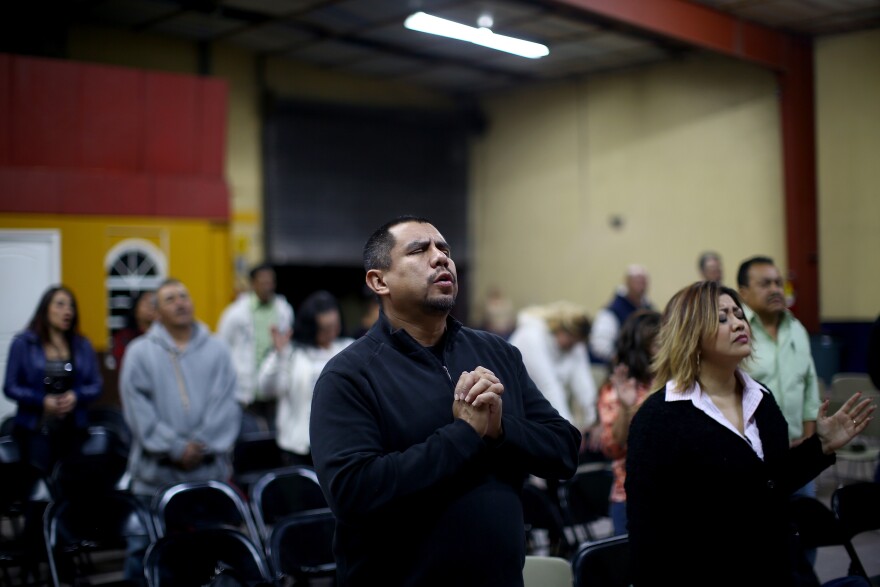During World War II, thousands of Americans lied about their age to enlist in the military. During the Iraq war, Daniel Torres lied about something else.
"I didn't want to be just another Mexican living in the U.S. I wanted to say I'd done something for the country," said Torres.
Torres' parents came to the U.S. legally, but overstayed their visas — leaving him without a green card. But in 2007, with the death toll in Iraq and Afghanistan peaking, a Marine Corps recruiter in Idaho was happy to rush through the formalities. Social Security number? Check. High school diploma? Check. Criminal record? None.
"Well, what about your birth certificate?" Torres remembers the recruiter asked.
"I'm from Mexico," Torres said. "He's like, 'Well, come back Monday.' "
Torres came back Monday with a U.S. birth certificate — it was fake, but for a good cause, he thought.
He deployed to Iraq, near Fallujah, in 2009. When his unit came home and started gearing up for a tour in Afghanistan, Torres lost his wallet. When he tried to get his ID replaced, his story came apart.
Instead of going to Afghanistan, Torres wound up in Tijuana, Mexico, unable to return to the country for which he had fought.
Immigrants have always made up a portion of the Armed Forces in America — joining the U.S. military has always been one of the fastest ways to get U.S. citizenship. About 8,000 troops with green cards became citizens that way last year alone.
But it doesn't happen automatically. And veterans who did not go through the process of becoming citizens — they can be deported, if they get in trouble later on, just like any other noncitizen.
"Many people are unaware that the United States deports military veterans," says Margaret Stock, a former Army lieutenant colonel and an immigration lawyer.
Stock says immigrants have been enlisting since 1775, and it's always been a fast track to citizenship.

"There's many legal reasons why you'd want immigrants serving in the United States military to get their citizenship," she says, since troops will be killing, dying and maybe getting captured under the U.S. flag.
Naturalization used to be part of basic training, but the laws changed, Stock says. As a result, lots of green card holders went to Iraq and Afghanistan without becoming citizens. She says the Obama administration has been aggressive about deporting immigrants who commit crimes, including veterans, though no one knows an exact number. It's rare enough that even Marine Daniel Torres says he'd never heard of it.
"When I got to Tijuana, I thought my case was unique. It wasn't until I found this place that I realized it was a bigger issue," Torres says.
This place is The Bunker, or the Deported Veteran Support House. It's a small storefront in eastern Tijuana with a few dormitory rooms. An Army vet named Hector Barajas has been running the shelter for about five years — at first from his home.

"When they'd deport any veterans, they would usually end up in my apartment. That's the system we had," Barajas says.
Barajas served in the Army for 5 1/2 years. He got out in 2001, after trying to get help for drug and alcohol addiction.
Soon after, he was involved in a shooting in Los Angeles — no one was hurt, but he did prison time. Then authorities drove him to the border and dropped him in Mexico.
Barajas spent time on the street himself. By the time he set up The Bunker, he knew what he was doing.
"Somebody coming in, they gotta sign in, go get a medical report. They have a certain time to stay here; everybody's got to look for a job. If you want to run a men's home, you gotta have some kind of a system for everything," Barajas says.
That includes drug rehab. When the guys who come to him need to clean up, Barajas sends them across town — to another deported veteran.

In a warehouse a few miles away, a band opens services at the "Cruising for Jesus" mission of Tijuana. Pastor Robert Salazar preaches on a stage flanked by classic East LA low-rider cars and trucks inside the church.
Salazar's church also runs a men's drug rehab shelter, and he's happy to help deported veterans. Salazar was a U.S. Marine in the mid-1990s. Just like Barajas, he got hooked on drugs and ran into trouble with the law. After a robbery conviction, Salazar was deported in 2005 — dropped at the Tijuana border at 3 a.m.
"I hadn't been here since I was 3 years old," Salazar says. "You might as well have dropped me off in China — that's how foreign this place was to me," he says.
He did all right, though. Salazar got religion and started his church. His wife came down and joined him. Ten years later, he says he wants to stay, but he'd like to be able to visit his family in California.
"I think I should have the right to visit my mother; my mother's 76 years old, with failing health," he says. "My daughter now is a Marine. She's been in the Marine Corps for nine months. I served in the Marine Corps. I should be able to see my daughter graduate boot camp."
Margaret Stock, the immigration lawyer, says the rules about deportation are confusing and not evenly applied. Congress could fix that, she says, but Washington is gridlocked, and immigration is now chained to election-year politics.

Stock says some of the deported vets in Tijuana may be able to get their cases reconsidered. Daniel Torres, the Marine who served in Fallujah, says he's still a loyal Marine, and he feels like he deserves to return to the U.S.
"We're not just some foreigners that got deported," Torres says. "We feel like Americans that have been banished, in exile from the country we love the most."
Copyright 2021 NPR. To see more, visit https://www.npr.org.




